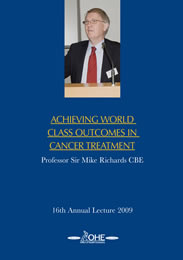Unlocking the Value of Combination Therapies

The speaker for the OHE’s 16th Annual Lecture was Sir Mike Richards, National Clinical Director for Cancer and End of Life Care in England’s Department of Health.
In his presentation, Prof Richards addressed five questions about the NHS achieving world class outcomes in…
The speaker for the OHE’s 16th Annual Lecture was Sir Mike Richards, National Clinical Director for Cancer and End of Life Care in England’s Department of Health.
In his presentation, Prof Richards addressed five questions about the NHS achieving world class outcomes in cancer: (1) What would ‘world class’ look like (2) What measures are appropriate? (3) Where are we now? (4) Why are England’s outcomes below the best? and (5) What do we need to do to close the gap?
‘World class’, according to Prof Richards, would mean that the overall burden of cancer in England would be as low as anywhere in the developed world, based on reliable international comparative data.
Prof Richards identified five primary measures of outcome: incidence, mortality, survival rates, the health and wellbeing of survivors, and the survivor’s experience of care. Comparing these variables across countries is not straightforward; data are available only for the first three and those often are out of date. He also identified a dozen secondary measures, focusing on public health programmes, access to care and the quality of care.
Data on ‘where we are now’ are dated, with the most recent international comparative data on incidence available for 2002 and data on mortality for 2004. Prof Richards points out, however, that what’s important is that the mortality rate from cancer in England is dropping ‘satisfactorily’ and is likely to meet the targets set.
With respect to care and survival, Prof Richards points to substantial progress in prevention (e.g., in smoking cessation), screening, waiting times and the use of multidisciplinary treatment approaches. He sees considerable opportunity for improvement in the proportion of patients receiving curative treatments, the use of palliative treatment (particularly chemotherapy), and one-year survival rates. To help better gauge progress, efforts to establish benchmarks and reliable international comparisons are underway.
No simple answer exists as to why England’s cancer outcomes are ‘below the best’. A new international benchmarking programme, involving countries with reliable data — Denmark, Sweden, Norway, Canada and Australia – is intended in part to help determine why cancer survival rates differ. A great deal of indirect evidence, however, points to late diagnosis and a low curative intervention rate as the main factors underlying England’s lower survival rates.
The first step in improving outcomes, according to Prof Richards, is to tackle low public awareness and/or negative beliefs about cancer to avoid late presentation, low uptake of screening and patients presenting as emergencies. To give a sense of the magnitude of the problem, he noted that a quarter of all patients with bowel cancer present as emergencies. Prof Richards also believes that GPs should have access to diagnostics and the necessary education and training to make full use of them. Finally, once diagnosed, cost-effective interventions such as laparoscopic surgery, high quality radiotherapy and systemic therapies should be widely available.
Achieving World Class Outcomes in Cancer Treatment
Richards, M.
(2011) Achieving World Class Outcomes in Cancer Treatment. OHE Monograph. Available from https://www.ohe.org/publications/achieving-world-class-outcomes-cancer-treatment/

